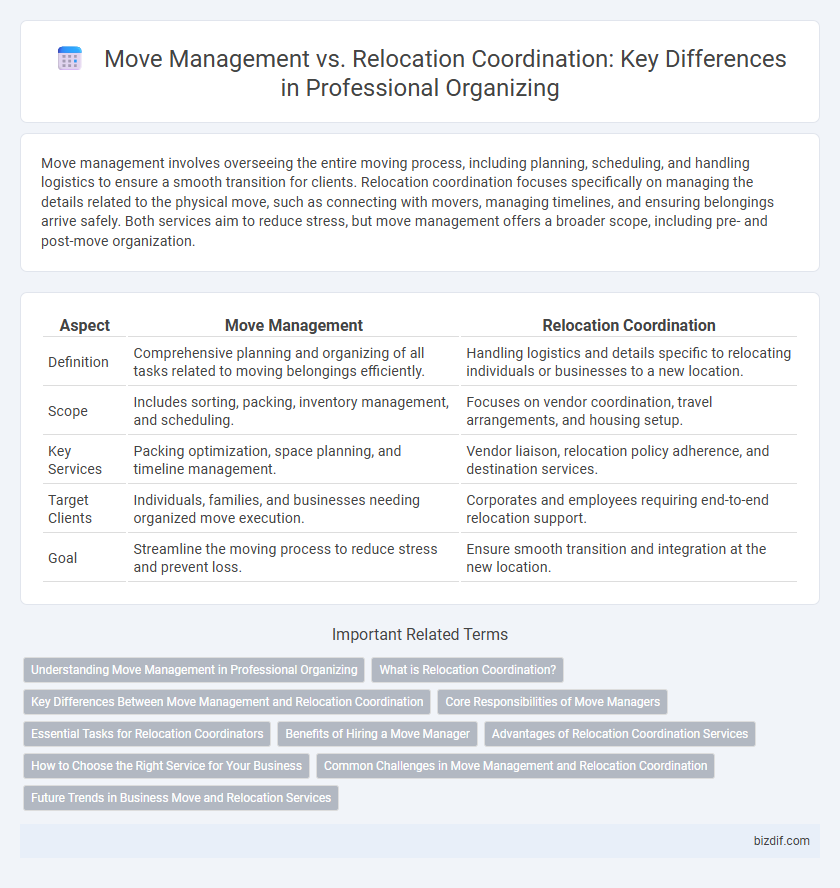Move management involves overseeing the entire moving process, including planning, scheduling, and handling logistics to ensure a smooth transition for clients. Relocation coordination focuses specifically on managing the details related to the physical move, such as connecting with movers, managing timelines, and ensuring belongings arrive safely. Both services aim to reduce stress, but move management offers a broader scope, including pre- and post-move organization.
Table of Comparison
| Aspect | Move Management | Relocation Coordination |
|---|---|---|
| Definition | Comprehensive planning and organizing of all tasks related to moving belongings efficiently. | Handling logistics and details specific to relocating individuals or businesses to a new location. |
| Scope | Includes sorting, packing, inventory management, and scheduling. | Focuses on vendor coordination, travel arrangements, and housing setup. |
| Key Services | Packing optimization, space planning, and timeline management. | Vendor liaison, relocation policy adherence, and destination services. |
| Target Clients | Individuals, families, and businesses needing organized move execution. | Corporates and employees requiring end-to-end relocation support. |
| Goal | Streamline the moving process to reduce stress and prevent loss. | Ensure smooth transition and integration at the new location. |
Understanding Move Management in Professional Organizing
Move management in professional organizing involves overseeing the entire moving process, from planning and packing to settling into the new space, ensuring a seamless transition. Relocation coordination typically focuses on logistics such as scheduling movers and transportation, while move management integrates organization strategies to reduce stress and increase efficiency. Understanding move management emphasizes personalized solutions tailored to client needs, optimizing space layout and workflow from day one.
What is Relocation Coordination?
Relocation coordination involves planning, organizing, and managing every aspect of a move to ensure a smooth transition from one location to another. It includes scheduling movers, overseeing packing and unpacking, handling logistics, and addressing any challenges that arise during the transport process. Professional relocation coordinators facilitate communication between clients, moving companies, and service providers to minimize stress and optimize efficiency throughout the move.
Key Differences Between Move Management and Relocation Coordination
Move management focuses on overseeing the entire moving process, including packing, transportation, and setup, ensuring a smooth transition from start to finish. Relocation coordination specifically handles logistical details related to employee moves, such as scheduling, housing, and vendor management, often within corporate relocation programs. Key differences lie in the scope, with move management being more comprehensive and relocation coordination targeting specific administrative and logistical tasks.
Core Responsibilities of Move Managers
Move managers specialize in overseeing the entire moving process, from initial planning and packing to transportation and final setup at the new location. Their core responsibilities include coordinating logistics, managing timelines, and ensuring seamless communication among movers, clients, and service providers. Move managers also handle inventory tracking, supervise loading and unloading, and provide personalized solutions to minimize disruptions during the transition.
Essential Tasks for Relocation Coordinators
Relocation coordinators manage essential tasks such as overseeing timelines, coordinating with movers, and handling documentation to ensure a smooth transition. They communicate with service providers, monitor inventory, and address client needs to prevent disruptions during the move. Unlike move management, relocation coordination focuses more on administrative precision and client communication to streamline the process.
Benefits of Hiring a Move Manager
Hiring a move manager ensures a streamlined transition by overseeing every aspect of the move, from planning and packing to setting up the new space, reducing stress and saving time. Move managers provide personalized solutions tailored to individual needs, enhancing efficiency and minimizing disruptions during the relocation process. Their expertise in logistics and vendor coordination guarantees that all details are managed professionally, leading to a smoother, more organized move compared to traditional relocation coordination services.
Advantages of Relocation Coordination Services
Relocation coordination services streamline the moving process by managing logistics, timelines, and vendor communication, reducing stress and ensuring efficiency. These services provide personalized support tailored to individual needs, enhancing organization and minimizing disruptions during the transition. Professional relocation coordinators also offer expertise in handling unexpected challenges, resulting in a smoother and more predictable move.
How to Choose the Right Service for Your Business
Move management focuses on overseeing the entire moving process, including planning, scheduling, and logistics to ensure a smooth transition for your business. Relocation coordination typically handles specific tasks such as vendor communication, employee support, and site setup, offering a more hands-on approach. Assess your business needs by considering the scale of the move and internal resources to determine whether comprehensive move management or targeted relocation coordination will provide the most efficient and cost-effective solution.
Common Challenges in Move Management and Relocation Coordination
Move management and relocation coordination both involve organizing logistics, yet move management often faces challenges such as tight timelines, managing multiple service providers, and handling last-minute changes. Relocation coordination frequently encounters difficulties in aligning employee needs with company policies, navigating complex travel arrangements, and ensuring smooth transitions between locations. Both fields require advanced communication skills and strategic planning to address these common obstacles efficiently.
Future Trends in Business Move and Relocation Services
Move management and relocation coordination are evolving with advanced technology integration, emphasizing personalized experiences and data-driven decision making to enhance efficiency in business moves. Future trends highlight the use of AI-powered tools and virtual reality for space planning, enabling seamless transitions and minimizing downtime for companies. Sustainable practices and flexible service packages also gain prominence, addressing environmental concerns and diverse client needs in corporate relocation services.
Move management vs relocation coordination Infographic

 bizdif.com
bizdif.com